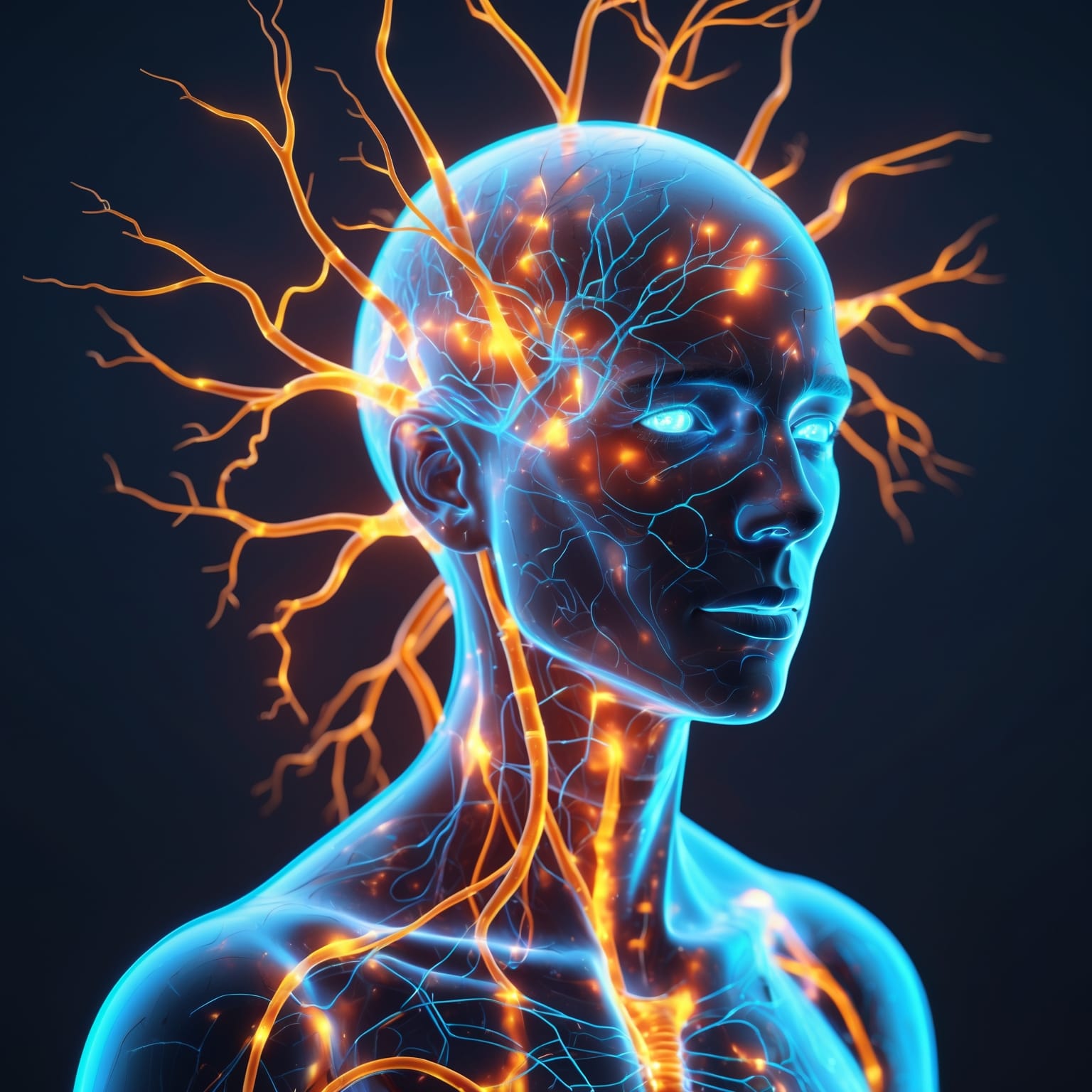Health Anxiety Perimenopause: Body Changes That Trigger Fear
Health Anxiety Perimenopause: Body Changes That Trigger Fear
Why normal hormonal transitions can create intense health fears and what neuroscience reveals about recovery
Specialized in Neurophysiology, Neuroimmunology, Neuropharmacology

Have you ever found yourself googling symptoms at 2 AM, convinced that the heart palpitations, dizziness, or strange fatigue you're experiencing signals something seriously wrong? If you're in perimenopause, you're not alone—and more importantly, you're not overreacting.
Research consistently shows that women entering perimenopause experience significant increases in health anxiety symptoms, often developing fears about serious illness despite normal medical evaluations. What many women don't realize is that these intense health fears aren't signs of weakness or hypochondria—they reflect measurable changes in how your brain processes body sensations during hormonal transition.
Through my background in neurophysiology and understanding of hormonal neuroscience, I've learned that health anxiety during perimenopause emerges from specific disruptions in interoception—your brain's ability to sense and interpret internal body signals. When hormones fluctuate, normal body sensations can become amplified and misinterpreted as signs of serious illness.
The Hidden Science: How Perimenopause Changes Body Awareness

What Most People Don't Know About Interoception
Your ability to sense what's happening inside your body—called interoception—operates like a sophisticated early warning system. The insular cortex, anterior cingulate cortex, and somatosensory regions continuously scan internal sensations and determine their significance for health and safety.
Under normal circumstances, this system filters millions of body sensations, allowing only potentially important signals to reach conscious awareness. Your heartbeat, breathing rhythm, digestive sounds, muscle tension, and temperature fluctuations normally operate in the background while your brain focuses attention elsewhere.
Here's what changes during perimenopause: Fluctuating estrogen affects how accurately your brain processes these internal signals, potentially making normal body functions feel louder, more noticeable, and more concerning than they once did.
Research from Stanford's Wu Tsai Neurosciences Institute demonstrates that estrogen significantly modulates interoceptive processing. When estrogen levels fluctuate during perimenopause, several changes occur:
Signal Amplification: Studies suggest that hormonal changes can increase sensitivity to internal body sensations, making normal functions more noticeable and potentially concerning.
Threat Detection Sensitivity: Research indicates that fluctuating hormones may affect threat assessment systems, potentially making the brain more likely to interpret ambiguous body sensations as potentially dangerous.
Context Processing Changes: The brain's ability to accurately contextualize body sensations (recognizing that chest tightness comes from stress rather than heart disease) may become less reliable during hormonal transitions.
The Radio Static Metaphor for Health Anxiety
Think of healthy body monitoring like clear radio reception: Your brain receives body sensations, filters them appropriately, and responds only to signals that merit attention. Perimenopause creates interference patterns—like atmospheric disturbance affecting radio clarity—where normal body "background noise" suddenly demands conscious attention and triggers health concerns.
This signal processing disruption explains why many women suddenly become hyperaware of heartbeat, breathing patterns, digestive sounds, and other body functions that previously went unnoticed. It's not that anything is necessarily wrong—it's that your brain's signal processing system is operating differently.
The Perfect Storm: Why Perimenopause Triggers Health Fears
When Normal Body Changes Feel Alarming
Perimenopause creates what researchers call a "perfect storm" for health anxiety development. Multiple factors converge simultaneously to create conditions where normal body changes trigger intense health fears:
Real Physical Changes Are Happening: Hormonal fluctuations create genuine physical sensations—heart palpitations, chest tightness, dizziness, temperature changes, digestive shifts—that can mimic symptoms of serious illnesses.
Sleep Disruption Amplifies Everything: Poor sleep quality during perimenopause impairs threat assessment accuracy and emotional regulation, making body sensations feel more alarming than they would when well-rested.
Inflammation Increases Symptoms: Research shows that hormonal changes can increase inflammatory markers, creating symptoms like joint pain, fatigue, and cognitive changes that can trigger health fears.
Stress Systems Become More Reactive: Studies indicate that perimenopause can make stress response systems more sensitive, causing normal stress reactions to feel like medical emergencies.
The "What's Normal?" Confusion
One of the most challenging aspects of perimenopausal health anxiety is uncertainty about what constitutes "normal" body changes. Unlike other life stages with predictable physical patterns, perimenopause introduces:

Unpredictable symptom patterns that make it difficult to establish what's "your new normal"
Symptom intensity that varies based on hormonal fluctuations, stress, and sleep quality
Multi-system symptoms that affect cardiovascular, neurological, digestive, and other body systems simultaneously
Medical validation challenges where providers may dismiss concerns as "just hormones" while symptoms feel genuinely distressing
The Specific Health Fears That Emerge
Cardiovascular Anxiety: When Your Heart Becomes the Enemy
You're lying in bed and suddenly become aware of your heartbeat. It feels irregular, too fast, or too strong. The chest tightness that accompanies hot flashes feels like impending cardiac arrest. You check your pulse obsessively, convinced something is wrong with your heart.
Heart Palpitations and Rhythm Changes: Hormonal fluctuations commonly cause noticeable heart rhythm variations that can trigger fears about heart disease or cardiac emergencies.
Chest Sensations: The combination of stress-related muscle tension and hormonal effects on circulation can create chest tightness or pressure that mimics heart problems.
Hot Flash Cardiovascular Symptoms: The rapid heart rate, flushing, and sweating associated with hot flashes can feel like cardiovascular emergencies rather than normal hormonal responses.
The Truth: While these sensations feel alarming, research shows that perimenopause-related cardiovascular symptoms are typically benign, though they deserve proper medical evaluation for peace of mind.
Neurological Health Fears: When Your Brain Feels Different
You walk into a room and forget why you came. You can't remember the word you need mid-sentence. You feel dizzy standing up, and your balance seems off. Suddenly you're convinced these are signs of dementia, stroke, or neurological disease.
Cognitive Changes: Memory lapses, difficulty concentrating, and "brain fog" during perimenopause can trigger fears about dementia or Alzheimer's disease.
Dizziness and Balance Issues: Hormonal effects on blood pressure regulation and inner ear function can create sensations that feel like serious neurological problems.
Headache Pattern Changes: New headache types or increased frequency can trigger fears about brain tumors or other neurological conditions.
Sensory Sensitivity: Increased sensitivity to light, sound, or physical sensations can feel like neurological dysfunction rather than hormonal changes.
Fatigue and Energy Fears: When Tiredness Feels Different
This isn't the tiredness you've experienced before. It's a bone-deep fatigue that doesn't improve with rest. You find yourself wondering if it's cancer, autoimmune disease, or some other serious condition slowly sapping your energy.
Profound Fatigue: The deep exhaustion accompanying hormonal changes feels qualitatively different from normal tiredness, triggering fears about cancer or autoimmune conditions.
Weight and Appetite Changes: Unexplained metabolic shifts can feel like symptoms of serious illness rather than normal hormonal adaptation.
Recovery Time Changes: Taking longer to bounce back from illness, stress, or physical exertion can trigger fears about immune system problems or underlying disease.
The Shame and Isolation Factor
When Seeking Help Feels Embarrassing
Research into shame and health anxiety reveals how women often carry significant shame about their health fears, especially when medical evaluations come back normal. This shame prevents many women from seeking the support they need.
Medical Dismissal: Being told symptoms are "just stress," "just hormones," or "just anxiety" can create shame about seeking help for genuine distress.
Rational Mind vs. Anxious Body: Knowing logically that you're probably fine while feeling genuinely scared creates internal conflict and self-criticism.
Social Comparison: Seeing other women navigate perimenopause without apparent health anxiety can trigger shame about your own sensitivity.
Identity Disruption: If you previously prided yourself on being "low-maintenance" about health, developing health anxiety can feel like personal failure.
This shame often prevents women from getting the support they need, creating isolation that intensifies both the physical symptoms and the anxiety about them. Breaking this cycle requires understanding that health anxiety during perimenopause is common and treatable.
The Inflammation Connection Nobody Talks About
How Your Immune System Fuels Health Fears
Here's something most healthcare providers don't mention: chronic low-grade inflammation, which commonly increases during perimenopause, directly contributes to both physical symptoms and health anxiety.
Research from UCLA's Cousins Center demonstrates that inflammatory cytokines can:
Increase Pain and Symptom Sensitivity: Making normal body sensations feel more intense and concerning than they would in a non-inflammatory state.
Amplify Threat Detection: Inflammatory signals can make the brain more hypervigilant for potential health threats.
Create Genuine Symptoms: Inflammation produces real symptoms—fatigue, joint pain, cognitive fog—that can mimic serious illnesses and legitimately trigger health concerns.
Disrupt Sleep and Mood: Inflammatory activation affects sleep quality and emotional regulation, making it harder to manage anxiety about physical symptoms.
Why This Matters: Addressing inflammation through lifestyle approaches often reduces both the physical symptoms and the anxiety about them more effectively than reassurance alone.
Evidence-Based Approaches to Health Anxiety Recovery
1. Interoceptive Accuracy Training
Research shows that improving interoceptive accuracy—your ability to sense body signals correctly—can significantly reduce health anxiety by increasing confidence in your body awareness.
Heartbeat Detection Practice: Learning to count your heartbeat without checking your pulse helps improve cardiac interoception and reduces heart-related health anxiety.
Breathing Awareness Training: Developing accurate awareness of breathing patterns helps distinguish between anxiety-induced breathing changes and respiratory concerns.
Body Scanning During Calm States: Systematic attention to body sensations when you're not anxious helps establish baseline patterns for comparison.
Accurate Sensation Description: Learning to describe body sensations precisely (location, intensity, quality, timing) rather than immediately jumping to diagnostic interpretations.
2. Medical Partnership and Advocacy
Building collaborative relationships with healthcare providers who understand perimenopause is essential for managing health anxiety effectively:
Provider Education: Working with healthcare providers who understand the physical and emotional aspects of perimenopause and can provide appropriate reassurance.
Symptom Documentation: Keeping detailed records of symptoms, triggers, and patterns to help distinguish hormonal fluctuations from other health concerns.
Preventive Care: Staying current with age-appropriate health screenings to reduce anxiety about undetected conditions.
Communication Skills: Learning to advocate effectively for your concerns while managing anxiety about medical interactions.
3. Nervous System Regulation Techniques
When health anxiety triggers fight-or-flight responses, specific techniques can help restore calm and clear thinking:
Vagus Nerve Activation: Cold water face immersion, gentle neck massage, or humming can activate parasympathetic recovery when health fears spike.
Grounding Techniques: 5-4-3-2-1 sensory awareness exercises help anchor attention in present reality rather than catastrophic health projections.
Progressive Muscle Relaxation: Systematic tension and release helps distinguish between anxiety-induced muscle tension and other body sensations.
Coherent Breathing: Specific breathing patterns (like 5-second inhale, 5-second exhale) can regulate heart rate variability and reduce anxiety-induced cardiovascular symptoms.
4. Addressing Root Biological Factors
Effective health anxiety treatment during perimenopause often requires addressing the underlying biological changes contributing to symptoms:
Sleep Optimization: Improving sleep quality during perimenopause helps restore accurate threat assessment and emotional regulation.
Inflammation Reduction: Anti-inflammatory approaches through nutrition, stress management, and lifestyle changes can reduce both symptoms and anxiety.
Stress Management: Chronic stress reduction helps prevent cortisol-driven inflammation that worsens both physical symptoms and health anxiety.
Hormonal Support: Working with healthcare providers to determine appropriate hormone support or natural alternatives may reduce triggering symptoms.
Always work with qualified healthcare providers for medical interventions and hormone-related decisions.
Working with Mara: Health Anxiety Recovery During Perimenopause
Specialized support that understands both the physical changes and emotional challenges
Meet Mara - Anxiety CoachMara specializes in health anxiety during perimenopause using approaches that address both neurobiological changes and medical navigation challenges:
Comprehensive Assessment: Understanding your unique health anxiety triggers, symptom patterns, medical history, and body awareness style.
Medical System Navigation: Supporting effective communication with healthcare providers while managing anxiety about medical appointments and procedures.
Symptom Interpretation Skills: Learning to contextualize body sensations within the framework of hormonal transition rather than catastrophic illness.
Body Trust Rebuilding: Developing confidence in your body's communication and resilience while maintaining appropriate health awareness.
Balanced Health Advocacy: Finding the optimal level of health monitoring and self-advocacy without excessive worry or medical avoidance.
Why Traditional Health Anxiety Treatment Often Falls Short
The Missing Pieces in Standard Approaches
Most health anxiety resources don't account for the unique challenges of perimenopause, where real physical changes complicate the typical "reassurance and cognitive restructuring" approach:
Real vs. Imagined Symptoms: Unlike other forms of health anxiety, perimenopause involves genuine physical changes that require accurate assessment rather than dismissal.
Medical System Challenges: Many healthcare providers lack comprehensive perimenopause training, leading to symptom dismissal that can worsen health anxiety.
Hormonal Complexity: The interplay between fluctuating hormones, inflammation, sleep, and stress creates symptoms that change unpredictably.
Identity and Control Issues: Perimenopause represents a major life transition that affects sense of control and body trust in ways that simple reassurance can't address.
The Interconnected Web of Perimenopause Recovery
Why Isolated Treatment Isn't Enough
Research suggests that health anxiety during perimenopause benefits from comprehensive approaches that address multiple interconnected factors. Integrated support programs recognize that health anxiety often intersects with:
- Sleep disruption and energy depletion where poor sleep amplifies symptom awareness while health fears disrupt sleep quality
- Shame and self-worth challenges where health anxiety triggers feelings of being "difficult" or "hypochondriacal"
- Identity transitions and life purpose questions where health fears intersect with mortality awareness and life meaning
- Relationship stress and communication changes where health anxiety affects partnership dynamics and support needs
Building Long-Term Health Resilience
The Goal Isn't Eliminating Health Awareness
Effective health anxiety recovery during perimenopause focuses on developing what researchers call "balanced health advocacy"—maintaining appropriate health awareness while preventing excessive worry:
Wise Body Listening: Learning to pay attention to body signals without hypervigilant monitoring that increases anxiety.
Medical Collaboration: Building trusting relationships with healthcare providers who understand perimenopause and validate appropriate concerns.
Information Processing Skills: Learning to research health topics without falling into catastrophic thinking or excessive self-diagnosis.
Uncertainty Tolerance: Developing comfort with the normal uncertainty that accompanies significant body changes during hormonal transitions.
The Bottom Line: Women who navigate perimenopause health concerns most successfully don't ignore their bodies or eliminate health awareness—they learn to interpret body signals accurately while maintaining appropriate medical care and emotional balance.
Your Body's Intelligence During Transition
Reframing Health Anxiety as Adaptive Awareness
Health anxiety during perimenopause often represents your body's intelligence working overtime to navigate unfamiliar biological territory. Your increased attention to physical sensations isn't pathological—it's adaptive awareness during significant change.
The challenge isn't eliminating this awareness but learning to interpret it skillfully. At NuraCove, we approach health anxiety during perimenopause as your nervous system's attempt to maintain safety during transition—an effort that deserves support and understanding, not shame or dismissal.
Mara is ready to help you transform health anxiety into wise body advocacy that serves your actual health needs without overwhelming your emotional well-being.

Ready to Transform Health Anxiety into Body Wisdom?
Get specialized support for health fears during perimenopause that honors your body's intelligence
Start with Mara Today Explore Comprehensive SupportWeekly Insights on Health Anxiety and Body Awareness
Get research-backed approaches to managing health fears during perimenopause with wisdom and balance.
Subscribe to NewsletterScientific References
- Craig AD. "How do you feel--now? The anterior insula and human awareness." Nature Reviews Neuroscience. 2009;10(1):59-70.
- Khalsa SS, Adolphs R, Cameron OG, et al. "Interoception and mental health: a roadmap." Biological Psychiatry: Cognitive Neuroscience and Neuroimaging. 2018;3(6):501-513.
- Freeman EW, Sammel MD, Lin H, Nelson DB. "Associations of hormones and menopausal status with depressed mood in women with no history of depression." Archives of General Psychiatry. 2006;63(4):375-382.
- Meerlo P, Sgoifo A, Suchecki D. "Restricted and disrupted sleep: effects on autonomic function, neuroendocrine stress systems and stress responsivity." Sleep Medicine Reviews. 2008;12(3):197-210.
- Pfeilschifter J, Koditz R, Pfohl M, Schatz H. "Changes in proinflammatory cytokine activity after menopause." Endocrine Reviews. 2002;23(1):90-119.
- Freedman RR. "Physiology of hot flashes." American Journal of Human Biology. 2001;13(4):453-464.
- Slavich GM, Irwin MR. "From stress to inflammation and major depressive disorder: a social signal transduction theory of depression." Psychological Bulletin. 2014;140(3):774-815.
- Dunn BD, Galton HC, Morgan R, et al. "Listening to your heart: how interoception shapes emotion experience and intuitive decision making." Psychological Science. 2010;21(12):1835-1844.
- Calder PC. "n-3 polyunsaturated fatty acids, inflammation, and inflammatory diseases." American Journal of Clinical Nutrition. 2006;83(6 Suppl):1505S-1519S.
Related Research-Based Articles
Ready for Professional Health Anxiety Support?
Get evidence-based coaching that understands the real challenges of perimenopause health fears
Contact NuraCove Our Safety Approach